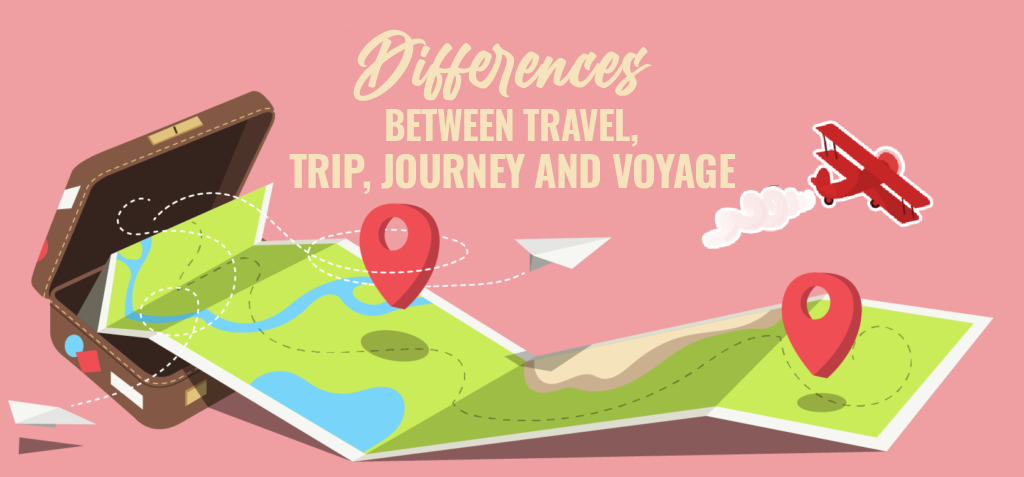Differences between travel, trip, journey and voyage

In this article, we are going to explain the differences between trip, travel, journey, and voyage and we will also advise you on how to correctly express both travel and trip in English.
One of the mistakes that Spaniards make most frequently when it is expressed in English is the incorrect use of travel, pronouncing it when in fact it must use trip or journey and when there is also the alternative of using “voyage” in certain cases.
A trip
| To trip una excursion. |
| trip incorporates every aspect of the trip, eg the hotels, restaurants, the experience, everything that is done, etc. |
| A journey un trayecto. |
| journey refers only to the movement from one place to another. |
| A voyage travesía, boat trip, or in space (Star Trek style). |
Travel |
| Travel is the “conceptual” noun – uncountable ( it is not said “a travel” ). |
| traveling the gerund: it is used at the beginning of sentences, after prepositions, and after verbs like “like”. |
| To travel the verb in the infinitive form |
Above it is clear that travel or its variants are not used for travel, but only for the verb to travel. Let’s go next step by step:
Travel
Travel means action, it is the act of traveling, moving from one place to another. You should never say ‘a travel’. In the cases that we use travel as a verb. Usually, we refer to how we go to school, to work, abroad … and generally referring to the environment and the way the trip is made. For example: “I travel to school by foot” or “I travel to work by train”. (Viajo a la escuela a pie o Viajo al trabajo en tren) Also when we use it as a noun, we refer to vacation trips. For example: «Do you remember when we traveled along the Costa del Sol? (¿Recuerdas de cuando viajamos por la Costa del Sol?)
- On weekends I travel in search of the sea.
Los fines de semana viajo en buscar del mar.
- Every time I can I travel by train.
Cada vez que puedo viajo en tren.
- On weekends I travel through Andalusia, I love its towns.
Los fines de semana viajo por Andalucía, me encantan sus pueblos.
- What I like the most is traveling along the coast.
Lo que más me gusta es viajar por la costa.
- I don’t like traveling with you because you run a lot in the car.
No me gusta viajar contigo porque corres mucho con el coche.
- When I go on a trip I usually travel as a traveler.
Cuando salgo de viaje suelo viajar en un viajero.
Trip
“Trip” is often used when someone goes somewhere, either for a short holiday or for a business trip where you must spend the night out. It frequently refers to a trip with a basic itinerary: you know the round trip date, and why you have to make the trip (such as a short trip abroad). It is often alluded to phrases such as «a business trip» (viaje de negocios), «a weekend trip» (escapada de fin de semana), «a day trip» (viaje de un día), «a school trip» (excursión escolar).
However, it is not ruled out to use it to refer to a more or less long journey , such as It is a long trip from Cadiz to Madrid (Se trata de un viaje largo desde Cadiz a Madrid) ¿Qué tal el viaje a Andorra? (Toda la experiencia: viaje y estancia).
Journey
Although trip and journey have the same definition, the journey is generally used to refer to a specific trip (it can even be an excursion or a short trip) in which a stay at the destination is assumed. It is possible and in fact, it is a journey defined as a long trip.
However, by focusing on the differences between trip, travel, journey, and voyage, the one that raises the most doubt is that between Trip and Journey, for this reason, and with the purpose of avoiding it, we have prepared this article to try to dispel doubts. The typical sentence to clarify the differences is: «There could be a few trips in a journey and certainly a lot of travel» (Puede haber algunos «trips» en un «journey» y, sin duda, mucho «travel»).
- I don’t want to go to Paris. I don’t like journeys that last so long!
No quiero ir a París. ¡No me gustan los viajes que duran tanto !
- We have been thinking for months about the journeys we have to do by plane.
Llevamos meses pensando en los viajes que tenemos que hacer en avión.
- We have spent two weekends at base camp preparing for the journey across the desert.
Hemos pasado dos semanas en el campamento base preparando el viaje por el desierto.
Voyage
Voyage is used to cite very long voyages, usually by sea and by air.
- I was very restless during the voyage to Chile.
Estaba muy intranquilo durante el viaje a Chile.
We hope that with this article we have managed to clarify the doubts that travel, trip, journey, and voyage raise among Spanish students. Actually, it is somewhat complicated, but practice through exercise will help, and in a short time to know what is the word that requires the phrase that we are building.



我非常喜欢 旅游门户。太棒了查看路线。